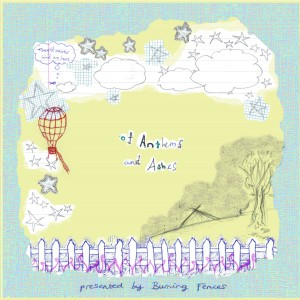
If the monastic community is numerous, the Hours shall be sung with antiphons; if small, without.
What is the place of artistic expressions within a community?
I have been on a community weekend away with Burning Fences where I was privileged to be able to organise/lead the input. I was acutely aware that, we, as a community, are experiencing some of the natural friction to life in relationship. There are multiple desires and visions to balance and contend with, there is the encouragement to bring brokenness and struggles into the public sphere in order to be known more deeply. All of this brings a highly volatile space and one that has, simultaneously both great potential for liberation and great risk of suffering and pain. We are not the first nor are we alone to experience some of this; it is the natural risk of relationship which commitment demands you fully enter and grasp.
I introduce this week’s reflection like this merely to highlight how this beloved community, who I consider to be the place from which I speak, the people with whom I speak and the situation to which I speak, is continually leading me into an deeper understanding of what a monastic apostolic community looks like. It also is proving to be the practical out workings of my reflections on the Rule of St. Benedict and I find that both inspiring and encouraging.
The other reason I begin by discussing Burning Fences is because, on the weekend away, we used Open Space Technology to hold conversations about that which is important to us as a collective. One of those discussions was on the place of creativity in community and explored (for the parts I was there for) the specific part of Burning Fences’ life; artistic expression/performance.
All of Burning Fences appreciate art in it’s many forms but not all of those who gather are able to contribute or, feel that they would like to. For some, Burning Fences is a place where they can explore new artistic endeavours, to try out and collaborate, but for others they don’t feel they are ‘creative’ in this way. Although I would not use that word for what they are expressing, choosing rather to use the word ‘artistic’, I do agree that there are some who are more competent and able to perform/present art in our group while others question what they have to offer to feel a part of Burning Fences.
On the Friday evening of our weekend away we held a ‘community circle’. This ‘community circle’ is a combination of haflat samar, story circles (traditionally held in the old celtic church) and Caedmon Evening (currently practiced by the Northumbria Community). The framework of the evening is everyone is invited to bring something to share as an expression of any kind. This contribution can be a simple joke, an epic poem, a song, a quote, anything that they think will inspire or facilitate reflection. I, as host, began by reading a story to frame the evening. I read a rewriting of Bede’s account of Caedmon who, loved listening in on such evenings but never felt able to contribute until, one night, he found himself dreaming about God giving him the gift of song. When he awoke he was able to sing beautifully. After this story, the group then participate in a collective act of art/liturgy. In this context liturgy acts as a binding together and bringing people together and encourages the group to express a shared desire or identity.
After this shared act the space is open for anyone to speak into it. People are encouraged to listen and respond how they feel is appropriate. The order of presentation is completely self-governed and each person places their contribution where they feel it fits best. By the end of the evening everyone had contributed something and it had flowed beautifully. There were some performances which may have been judged ‘better’ than others but in the light of day I could not tell you which was which because in that space of community it was not the objective quality that was important but the way in which we (and our offering) interacted with others. (You can read a poem which I wrote during our ‘community circle’ here.)
So what is the place of artistic expressions within a community?
For many communities the use of music and song is central to their community gatherings. Rituals and liturgical frameworks use music and rhythm. A community at its most basic is a social group whose members share a commonality of some kind. In order to maintain a cohesion to any community there needs to be an expression of that shared commonality, be they beliefs, locality, ideas or any other identifiers. This most profound way of doing this is through the evocative and emotive use of music. Artistic expression, therefore, takes an important part of many communities.

The place of art
What I find interesting about this chapter in the Rule of St. Benedict is the directions for when a community is small.
If the monastic community is numerous, the Hours shall be sung with antiphons; if small, without.
This is music to my ears (excuse the pun). I do not have a strong singing voice and I am very self conscious. I love to listen to singing and particularly choral harmonies but I struggle to participate. I join in singing if there is enough noise to drown me out and I am confident no one can hear my unstable voice. If I am leading a small group and I would love to worship in that context then I must rely on others’ abilities to lead in sung worship or otherwise we don’t get to enjoy that experience. Even when there is someone else leading the singing I struggle to join in and end up mute hoping no one notices that I am singing and feeling concerned that I am distancing myself from the group.
One phrase that stands out from the discussion on the place of creativity in community, particularly a group like Burning Fences, was that,
Artistic expression is affirmed/valued but not enforced.
We, as a community, appreciate artistic expression and will encourage anyone, whatever level of competency they have, to contribute but we do not enforce it as a necessary part of membership. This does mean that the more experienced artists are more prominent when it comes to the times for artistic expression but that does not equate to being more valued within the community. We appreciate that offering because, for some, we cannot make it but we want to enjoy it as a gathering activity but that does not mean that those members who can are in some way more important. If there is no offering in this way then you adapt, for the act must primarily be a communal expression and only then must we consider the practicalities of how we make it happen.
Artistic expression is appreciated but it is not a marker of your place in the community.
Reflection
Community should be a space where people feel safe and free to let down forced personas and be vulnerable. This makes community a difficult place because there is a high risk of it getting very messy very quickly and this kind of life should not be entered into lightly. It does require a level of commitment from a number of people or it will never achieve the level of trust and intimacy required for this vulnerability to be life-giving. It is only in a safe, trusting, committed community where people are free to explore new expressions of themselves and embrace the risk of failure in working out relationships and connection. This can be done through artistic expressions and, indeed, it is a special kind of expression, but it is not the only way.
We at Burning Fences, appreciate and affirm the musical and poetic expressions of beauty and we enjoy them together, even though not every member can directly contribute. We, the more experienced/confident artists are only able to express our shared commonality by listening and knowing all members. Membership is not measured by the artistic contributions one makes but by the depth of relationships you participate in.
Creative God in Trinity, you make us to know and enjoy beauty with others. We thank you for the ability of some to create beautiful music and song, images and poetry. We thank you for others who create beautiful relationships with equal skill. We thank you for others who support the beauty of life in their skills to construct order and stability in practical ways. We thank you for all of this as expressions of your immeasurable creativity in all things.
Come, Lord Jesus.



 All artists are seeking that surprise because it is a divine moment; a meeting with a force unnameable, holy. It is un-manufacturable and many have tried to force it only to be left high and dry. The reason it can’t be rushed or made to happen is because if you’re focussing on creating a surprise it will no longer be a surprise.
All artists are seeking that surprise because it is a divine moment; a meeting with a force unnameable, holy. It is un-manufacturable and many have tried to force it only to be left high and dry. The reason it can’t be rushed or made to happen is because if you’re focussing on creating a surprise it will no longer be a surprise. I have had the privilege of being welcomed into a community over the last year which has had an ongoing and deeply transformative impact on me and my vocation as an ordained priest. The community are mainly in their twenties and would, at a cursory glance, be classified as ‘arty’ intellectual types, although this is not entirely true; not that they are not either of those things but that which unites this group isn’t those two general categories. It is only in the last month or so that I have begun to grasp the ‘charism’, the ‘je ne sais qua’, of Burning Fences.
I have had the privilege of being welcomed into a community over the last year which has had an ongoing and deeply transformative impact on me and my vocation as an ordained priest. The community are mainly in their twenties and would, at a cursory glance, be classified as ‘arty’ intellectual types, although this is not entirely true; not that they are not either of those things but that which unites this group isn’t those two general categories. It is only in the last month or so that I have begun to grasp the ‘charism’, the ‘je ne sais qua’, of Burning Fences. Before I stumbled through the doors one cold December night, this community had been meeting, singing and telling stories for a year or more. They had produced a CD of songs which they had developed entitled ‘Of Anthem and Ashes’. The images that were resonating with them then and remain reverberating through our times together are phoenix like resurrections; songs sung in the rubble, new plants breaking through concrete. These images have always resonated with me and it’s why I know I am a ‘fence burner’.
Before I stumbled through the doors one cold December night, this community had been meeting, singing and telling stories for a year or more. They had produced a CD of songs which they had developed entitled ‘Of Anthem and Ashes’. The images that were resonating with them then and remain reverberating through our times together are phoenix like resurrections; songs sung in the rubble, new plants breaking through concrete. These images have always resonated with me and it’s why I know I am a ‘fence burner’. The times when Church is most frustrating, for me, is in the ‘necessary organization’. What irks me is the lack of convincing Biblical precedent. The Temple system failed and yet here we are in the 21st century rebuilding it. I get it, organic is messy and uncontrollable, unpredictable but it’s how the world functions. We human beings are devastating when we control and tinker with the organic creation. We’ve tried to organize the world and what we discover is we’re trapped in boxes which do not fit nor encourage us to flourish in the ways in which we should.
The times when Church is most frustrating, for me, is in the ‘necessary organization’. What irks me is the lack of convincing Biblical precedent. The Temple system failed and yet here we are in the 21st century rebuilding it. I get it, organic is messy and uncontrollable, unpredictable but it’s how the world functions. We human beings are devastating when we control and tinker with the organic creation. We’ve tried to organize the world and what we discover is we’re trapped in boxes which do not fit nor encourage us to flourish in the ways in which we should.